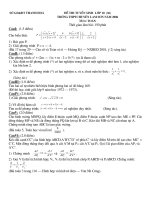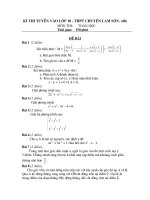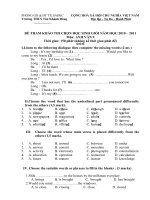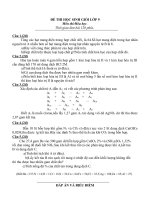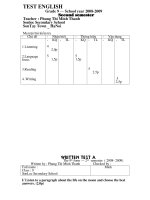100 đề luyện thi HSG tiếng anh 9 có đáp án đề 40
Bạn đang xem bản rút gọn của tài liệu. Xem và tải ngay bản đầy đủ của tài liệu tại đây (99.79 KB, 8 trang )
ENGLISH PRACTICE 20
Part A: Pronunciation
I. Choose the word (A, B, C or D) whose underlined part is pronounced differently from the others in
the same group (circle your choice).
1. A. parachute
B. champagne
C. chivalry
D. churchgoer
2. A. inflexible
B. elegant
C. experiment
D. recollection
3. A. breakfast
B. already
C. feasible
D. heather
II. Choose the word that has main stress placed differently from the others.
1. A. contaminate
B. population
C. biology
D. environment
2. A. tournament
B. organism
C. postpone
D. interested
Part B: Vocabulary
I. Find a suitable word to fill in each blank in the sentences
1. There are …………………. kinds of animals in the forest.
2. He is a farmer who ……………. horses.
3. A …………..devotes his whole life to looking after the forest.
4. The earthquake had a lot of …………………… on the infrastructure.
5. Can we see ………………….. the earth is a globe?.
II. Choose the best word to complete each of the following sentences.
1. Hoa: “Are you going to buy a new computer or just continue using the old one?”
Mary: “_________”
A. Yes, I am.
B. Yes, I’d like one. Thank you.
C. That’s impossible. I can’t afford a new one.
D. Neither. I’m going to lease one.
2. Mr. Black: “What a lovely house you have!” Mr John: “_________”
A. No problem
B. Thank you. Hope you will drop in.
C. Of course not, it’s not costly
D. I think so.
3. You have never been to Italy, ________?
A. have you
B. haven’t you
C. did you
D. had you
4. You can’t tell what someone is like just from their ________.
A. character
B. looking
C. appearance
D. personality
5. “I have an idea. Let’s go for a swim on Sunday afternoon”. - “________”
A. OK, what time?
B. You’re kidding
C. I know
D. I’m sure
Part C: Grammar
Choose the correct form of the verbs to complete the sentences.
1. My friend, Mary, arrived after I ________ for her about half an hour.
A. was waiting
B. had been waiting
C. have been waiting
D. have waited
2. My daughter saw an elephant this morning, but she ________ one before.
A. had never seen B. has never seen
C. never sees
D. never had seen
3. You ………….her, because she didn’t say that.
A. must misunderstand
B. must have misunderstood
C. must be misunderstanding
D. had to misunderstand
4. As a famous person _____ many children admire, it is important for her to act responsibly.
A. whose
B. whom
C. which
D. when
5. Our new coach is popular ________ the whole team.
A. with
B. to
C. by
D. for
6. Mary's children are used to ______ after school every day. They don't have to walk home.
A. picking up
B. being picked up
C. be picked up
D. pick up
7. The doctor advised me ________late.
A. not staying up B. not stay up
C. not to stay up
D. did not stay up
8. Linda was the last student________ at the oral exam.
NGA NGUYỄN
A. to be asked
B. asking
C. asks
D. to ask
9. Jane's summer vacation in England led to ________ an Englishman.
A. her marry
B. her to marry
C. her being married
D. her marrying
10. The publishers expect that the new biography of Simon Bolivar will be bought by people ________ in Latin
American history.
A. who they are interested
B. interested C. are interested
D. they are interested
Choose the correct word to complete each of the sentences
1. Last year, Peter earned …………………………… his brother.
A. twice as much as
B. twice as many as
C. twice more than
D. twice as more as
2. After the terrible traffic accident, ____ injured were taken to ______ hospital immediately.
A. a/ the
B. the/ Ø
C. an/ the
D. the/the
3. The news of Julia’s engagement caused great ________.
A. excite
B. excited
C. exciting
D. excitement
4The new office block …………… well with its surroundings.
A. bends in
B. stands out
C. shapes up
D. sets off
5. Are your plans for this weekend still ………………..?
A. the same
B. same
C. like
D. alike
6. Floria, …………… as the Sunshine State, attracts many tourists every year.
A. being known
B. that is known
C. known
D. is known
Word formation: Write the correct form of the words in parentheses in the blanks
1. She’s extremely …………….(KNOWLEDE) about modern art.
2. There was a ____________ (WIDE) dissatisfaction with the government’s policies.
3. Her health has ____________ (BAD) considerably since we last saw her.
4. A lot of plants and animals could be used as medicines against cancer, AIDS,
heart diseases and other ____________ (SICK).
5. He was ____________ (INFORMATION) of the consequences in advance.
Part D: Reading Comprehension
I. Choose the word or phrase that best fits the blank space in the following passage.
Schools in the United States have not always had a large number of libraries. As
(1)________as 1958 about half of the public schools in the United States had no libraries at all. The number of
public school libraries increased dramatically (2)_______ the federal government passed the Elementary and
Secondary Education Act of 1965, ( 3)_______ provided funds for school districts to improve their education
programs and facilities, including their libraries. (4) ________, many educators claim that since the legislation
was passed federal spending has not increased sufficiently to meet the rising (5)______ of new library
technologies such as computer databases and Internet access.
Because the federal government provides only limited funds to schools, individual school districts (6)
_______ on funds from local property taxes to meet the vast majority of public school expenses. Therefore, the
libraries of the public schools tend to reflect the (7) ______ capabilities of the communities in which they are
located. Districts in wealthy suburbs often have fully staffed libraries (8) _______ abundant resources,
spacious facilities, and curricular and instructional support. In (9) ______, school districts in many poor areas
house their libraries in ordinary classrooms or in small rooms. The libraries in such areas are generally
staffed by volunteers, who organize and (10) ______ books that are often out-of date, irrelevant, or damaged.
1. A. freshly
B. recently
C. frequently
D. newly
2. A. though
B. with
C. during
D. when
3. A. that
B. who
C. which
D. this
4. A. Nevertheless
B. Therefore
C. Consequently
D. Otherwise
5. A. fine
B. fee
C. cost
D. sum
6. A. go
B. come
C. rely
D. stay
7. A. educational
B. economical
C. political
D. financial
NGA NGUYỄN
8. A. for
B. with
C. on
D. by
9. A. country
B. converse
C. contrast
D. conflict
10. A. attain
B. obtain
C. contain
D. maintain
II. Read the following passage and write the answers for the questions
According to airline industry statistics, almost 90 percent of airline accidents are survivable or
partially survivable. But passengers can increase their chances of survival by learning and following certain
tips. Experts say that you should read and listen before take off and ask questions if you have uncertainties.
You should fasten you seat belt low on your hips and as tightly as possible. Of course, you should also know
how the realize mechanism of your belt operates. During takeoffs and landings, you are advised to keep your
feet flat on the floor. Before takeoff you should locate the nearest exit and a alternative exit and count the
rows of seats between you and the exits so that you can find them in the dark if necessary.
In the event that you are forewarned of a possible accident, you should put your hands on your
ankles and keep your head down until your plane comes to complete stop. If smoke is present in the carbin,
you should keep your head low and cover your face with napkins, towels or clothing. If possible, wet these
for added protection against smoke inhalation. To evacuate as quickly as possible, follow crew commands
and do not take personal belongings with you. Do not jump on escape slices before they are in front of you.
When you get to the ground, you should move away from the plane as quickly as possible, and never smoke
near the wreckage.
1.What is the main topic of the passage?
…………………………………………………………………………………………………
2. According to experts, when are travelers urged to read and listen to safety instructions?
………………………………………………………………………………………………….
3. Which exits should an airline passenger locate before takeoff?
………………………………………………………………………………………………….
4. Find out a word which is synonym with the word “evacuate” in the passage.
………………………………………………………………………………………………….
5. What does the paragraph following the passage most probably discus?
………………………………………………………………………………………………….
III.Read the following passage and choose the best answer for each of the questions
As Christmas evolved in the United States, new customs were adopted and many old ones were
reworked. The legend of Santa Claus, for example, had origins in Europe and was brought by Dutch settlers
to New York in the early 18 th century. Traditionally, Santa Claus – from the Dutch Sinter Klas – was depicted
as a tall, dignified, religious figure riding a white horse through the air. Known as Saint Nicholas in Germany,
he was usually accompanied by Black Peter, an elf who punished disobedient children. In North America he
eventually developed into a fat, jolly old gentleman who had neither the religious attributes of Saint
Nicholas nor the strict disciplinarian character of Black Peter.
Santa’s transformation began in 1823, when a New York newspaper published the poem A Visit from
Saint Nicholas, which Clement Clark Moore had written to amuse his daughter. The poem introduced many
Americans to the story of a kindly saint who flew over housetops in a reindeer-drawn sleigh. Portraits and
drawings of Santa Claus by American illustrator Thomas Nast further strengthened the legend during the
second half of the 19th century. Living at the North Pole and assisted by elves, the modern Santa produced
and delivered toys to all good children. By the late 19 th century he had become such a prominent figure of
American folklore that in 1897, when Virginia O’Hanlon wrote to the New York Sun newspaper asking if
Santa was real, she received a direct answer: “Yes, Virginia, there is a Santa Claus”.
1. Who brought the legend of Santa Claus to the USA according to the passage?
A. Sinter Klaas
B. Saint Nicholas
C. A German
D. Dutch settlers
2. Santa Claus was traditionally described as a
A. tall man who could walk through the air B. fat, jolly, old man
C. religious figure
D. fat man riding a white horse
NGA NGUYỄN
3. Santa Claus in North America was depicted as
A. a man with the strict disciplinarian character of Black Peter
B. a good old man with less religious character
C. one with religious attributes of Saint Nicholas
D. a jolly man on horseback
4. Who was Black Peter?
A. an elf accompanying Saint Nicholas
B. an elf who rode a white horse
C. one of the disobedient children
D. a popular traditional figure
5. What word is closest in meaning to attributes?
A. symbols of a person
B. natural qualities C. effects
D. outer appearance
6. Where did the legend of Santa Claus come from?
A. the North Pole
B. Europe
C. North America
D. the City of New York
7. 1823 was mentioned as a year when
A. Clement Clark Moore wrote his first poem
B. Clement Clark Moore’s poem made him popular
C. Saint Nicholas visited New York
D. the image of Santa Claus was transformed
8. According to Clement Clark Moore’s poem
A. Santa Claus had nothing different in appearance from the traditional one
B. Santa Claus had wings and could fly
C. Santa Claus liked poetry
D. Santa Claus was a kindly saint who flew over housetops in a sleigh
9. The answer Yes, Virginia, there is a Santa Claus is an illustration for the fact that
A. the New York Sun was popular with children
B. Santa Claus was a prominent figure at that time
C. newspapers are unreliable
D. Virginia O’Hanlon was a reader of the New York Sun
10. Which of the following statements is TRUE?
A. Santa Claus was an imaginary old man created by artists based on traditional figures
B. Living in the North Pole, Santa Claus visited children at Christmas
C. Santa Claus was a real figure living in northern America
D. Santa Claus was a story based on Saint Nicholas and Black Peter
Part E: Writing
I. Identify the errors in the following sentences.
1. (A) How (B) did you manage (C) getting here (D) so quickly?
2. Ms Baker , (A) she spent (B) her life working with the health and (C) welfare of (D) the families of worker,
is an successful woman in the world.
3. (A) Because of the Lewis and Clark Expedition in 1972, the United States (B) begin to realize (C) the true
value of the Louisiana (D) territory.
4. I (A) remember (B) to be given a toy drum (C) on my (D) fifth birthday.
5. You can (A) lead a horse to water (B) but you can't (C) make him (D) drinking.
II. Sentence Transformation.
Rewrite the following sentences with the words provided so that the meaning of each sentence
remains unchanged.
1.Andrew is the most generous person I have ever met.
I’ve yet……………………………………………………………………………
2. Far more people live to retirement age in Britain than in Philippines.
Not……………………………………………………………………………….
3. His father is going to fix the ball for him tomorrow.
He is going …………………………………………………………………………
4. She never seems to succeed even though she studies much.
NGA NGUYỄN
Much…………………………………………………………………………………
5. I never thought that I would win a prize.
It had…………………………………………………………………………………
Complete the second sentence so that it has a similar meaning to the first sentence, using the
suggested word.
1. Just after solving one problem, I was faced with another.
Hardly ………………………………………………………
2. Getting specialized qualification will benefit you.
It will be in …………………………………………………
3. We have to repay the loan, now that we have promised to.
We are.………………………………………………………
4. ‘Oh, just a minute, was it Leonardo or Michelangelo who painted the Mona Lisa?’
He couldn’t remember ………………………………………..
5. The company will well make a profit next year.
I wouldn’t be surprised …………………………………………
III. Writing an essay.
Write about a film you like best (200-220 words)
KEYS – PRACTICE 20
Part A: Pronunciation
I. Choose the word (A, B, C or D) whose underlined part is pronounced differently from the
others in the same group (circle your choice). (0.6 point)
1. D.
2. D
3. C.
II. Choose the word that has main stress placed differently from the others. (0.4 point)
4. B.
5. C.
Part B: Vocabulary
I. Find a suitable word to fill in each blank in the sentences. (1 point)
1. various 2. breeds.
3. forester.
4. damage.
5. that.
II. Choose the best word to complete each of the following sentences. (1 point)
1. D.
2. B.
3. A.
4. C.
5. A.
Part C: Grammar
I. Lexico-grammar.
Choose the correct form of the verbs to complete the sentences. (2 points)
1. B
2. A
3. B
4. B
5. B
6. B
7. C
8. A
9. D
10. B
Choose the correct word to complete each of the sentences. (1.2 points)
1. A
2. D
3. C
4. A
5. A
6. C
III. Word Formation.
Write the correct form of the words in parentheses in the blanks (1 point).
1. knowlegeable
2.widespread.
3. worsened.
4. sickness.
5. informed .
NGA NGUYỄN
Part D: Reading Comprehension
I. Choose the word or phrase among A, B, C or D that best fits the blank space in the following
passage. (2 points)
1. B.
2. D.
3. C.
4. A
5. C
6. C
7. D.
8. B.
9. C.
10. D
II. Read the following passage and write the answers for the questions. (1 point)
1. Guidelines for increasing aircraft passenger survival.
2. before take off.
3. The two closest to the passenger’s seat.
4. move away.
5. How to proceed once you are away from the aircraft.
III. Read the following passage and choose the best answer for each of the questions. (2 points)
1. D
2. C
3. B.
4. A
5. B
6. B
7. D
8. D
9. B
10. A.
Part E: Writing
I. Identify the errors in the following sentences. (1 point)
1. C
2. A
3. B
4. B
5. D
II. Sentence Transformation.
Rewrite the following sentences with the words provided so that the meaning of each
sentence remains unchanged. (1 point)
1. I’ve yet to meet anyone who is more generous than Andrew.
2. Not as many people live to retirement age in the Philippines as in Britain.
3. He is going to have his father fix the ball tomorrow.
4. Much as she studies, she never seems to succeed.
5. It had never crossed my mind that I’d win a prize.
Complete the second sentence so that it has a similar meaning to the first sentence, using the
suggested word. (1 point)
1. Hardly had I solved one problem than I was faced with another.
2. It is/will be in your interests to get/that you get a specialized qualification.
3. We are obliged to repay the loan. / We are committed to repaying the loan.
4. He couldn’t remember if it was Leonardo or Michelangelo who (had) painted the Mona
Lisa?
5. I wouldn’t be surprised if the company made a profit next year.
III. Writing an essay. (2.8 points)
Write about a film you like best (100-120 words)(2.8ps)
Open:.0.5
Body:1.8
Conclusion:0.5
NGA NGUYỄN
NGA NGUYỄN
NGA NGUYỄN
